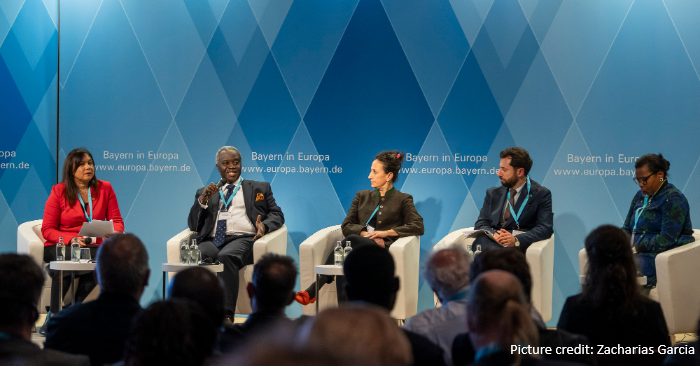
Follow-up report on the ‘Cooperation Lounge Africa-Europe: Science meets Politics’ in Brussels

Panel Discussion at the Cooperation Lounge Africa-Europe
For a Closer Cooperation between Africa and Europe in R&I
At the opening of the high-level evening event, Michael Hinterdobler (Director of the Representation of the Free State of Bavaria to the EU), Eric Beißwenger (State Minister for European and International Affairs, Government of the Free State of Bavaria), Mohamed Igueh Ofleh (Deputy Head of Mission of the African Union Permanent Mission to the European Union) and Nicola Bellomo (Head of the Pan-African Division, European External Action Service) highlighted in their speeches the potentials and needs of closer cooperation between the continents in R&I to tackle global challenges.
Science Policy for R&I between Africa and Europe
In the following panel discussion, moderated by Alison April (Stellenbosch University International), the renowned speakers Professor Willem Fourie (Stellenbosch University), Professor John O. Gyapong (African Research Universities Alliances (ARUA)), Dr Daphne Keilmann-Gondhalekar (Technical University Munich), Dr Vincenzo Lorusso (DG Research and Innovation of the European Commission), and Eudy Mabuza (Embassy of the Republic of South Africa) discussed how the dialogue between research and politics could be strengthened. The participants highlighted the need to
- support research projects with African and European participation through politics, e.g., through the fast issuance of visas for researchers and the provision of sufficient funding to co-create projects that serve the needs of the population;
- create further research-intensive universities and clusters of excellence at African universities;
- support the AU-EU Innovation Agenda to create tangible outputs from research and innovation;
- work transdisciplinary beyond universities with policymakers, researchers, and enterprises to develop solutions for urgent issues, such as climate change;
- use the scientific innovations of AI for evidence-based policymaking;
- bring international researchers and policymakers together to work on solutions in both the Global South and North since developments in one continent impact the other.
After an exciting discussion with the audience, Dr Emmanuel Benjamin (University of the Bundeswehr Munich) revealed an aquaponics prototype to present hands-on insights into the project INCiTiS Food, which receives EU funds to create an inclusive and circular food system in African cities. Afterwards, more than 120 participants from various fields of research, innovation, politics, and funding agencies used the opportunity to connect during an evening reception with Bavarian and African food and an accompanying poster exhibition.
What R&I Projects Need for Productive Cooperation between Africa and Europe
The second day of the event started with an introduction keynote to science policy and science diplomacy by Angela Schindler-Daniels (DLR Projektträger and EU Science Diplomacy Alliance) to prepare the participants to practice science policy themselves. During an interactive workshop/World Café, more than 80 participants from research, politics, and funding agencies discussed in small, rotating groups how the calls for proposals and the project management could be improved and how collaborations between Africa and Europe could become more equitable.
Key findings from the group discussions ask, among others, to
- shift the paradigm from aid- and development-oriented research to investment in knowledge and solutions from the African continent;
- learn mutually between Europe and Africa;
- not impose European standards and models on Africa but follow bottom-up approaches and co-creation of projects that suit the manifold realities in the African continent;
- enable participation of the African Union in the creation of calls of the European Union that target Africa;
- take into account the differences in countries and regions of the African continent;
- reduce bureaucracy in international and intercontinental projects;
- share budget responsibilities between all partners;
- adjust accounting rules to local realities, e.g., allow the use of mobile money;
- involve administrative staff in the creation of proposals;
- accept international project proposals and management in more languages than English, as in the EU.
Thank You
We thank all participants for their engagement and, in particular, the table moderators of the World Café: Professor Isabella Aboderin (University of Bristol, Africa Charter), Dr Celine Dondeynaz (European Research Executive Agency), Dr Nico Elema (Stellenbosch University International), Dr Harison Kipkulei (Univerity of Augsburg), Dr Kathrin Knodel (German Research Foundation), Dr Shem Kuyah (Jomo Kenyatta University of Agriculture and Technology), Professor Carsten Lorz (University of Applied Sciences Weihenstephan-Triesdorf), Sean Rowlands (The Guild), and Anna Stegmann (BayFOR).
The Bavarian Research Alliance, with its offices in Munich, Nuremberg and Brussels and its Scientific Coordination Office Bavaria-Africa of BayFOR, look forward to further collaborations in R&I between Bavaria, Europe, and Africa.





